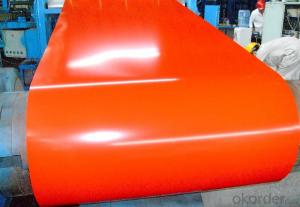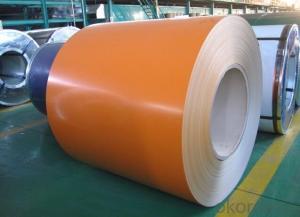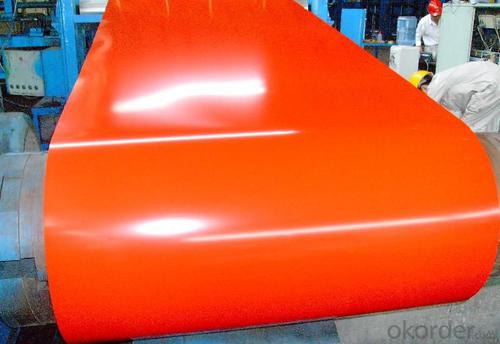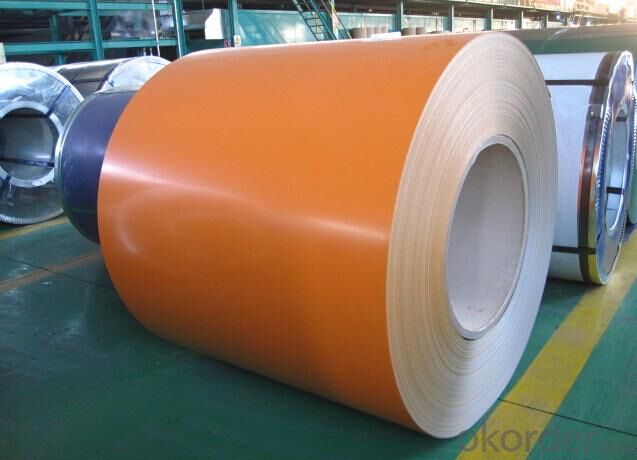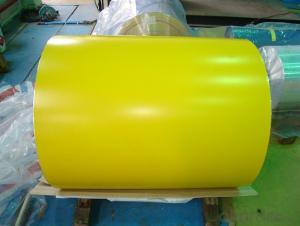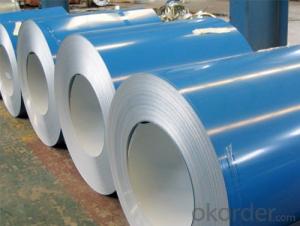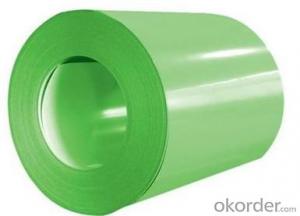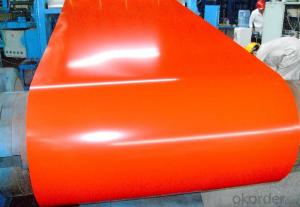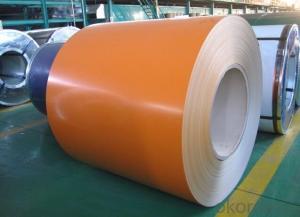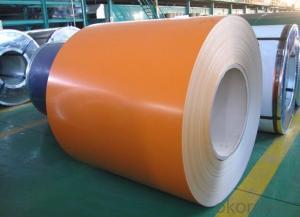Pre-painted Galvanized/Al uzinc Steel Sheet Coil with Prime Quality and Lowest Price orange
- Loading Port:
- Shanghai
- Payment Terms:
- TT OR LC
- Min Order Qty:
- 100 m.t.
- Supply Capability:
- 10000 m.t./month
OKorder Service Pledge
OKorder Financial Service
You Might Also Like
1.Pre-Painted Galvanized/Aluzinc Steel Coil Description:
Category of Painting | Item | Code | |
Polyester | PE | ||
High-durability polyester | HDP | ||
Silicon modified polyesters | SMP | ||
Painting Thickness | Top side: 5+20microns; | ||
Bottom side: 5~7microns. | |||
Color System | Produce according to RAL Color System or as per buyer’s color sample. | ||
Painting structure | Top surface | Bottom surface | |
Primer coating | No coating | 1/0 | |
Primer coating | Primer coating | 1/1 | |
Primer coating + Finish coating | No coating | 2/0 | |
2/1 | |||
2/2 | |||
3.Detail Images of Pre-Painted Galvanized Steel Coil
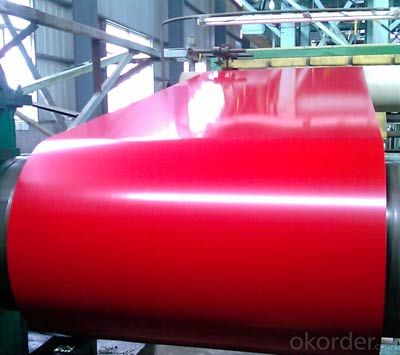
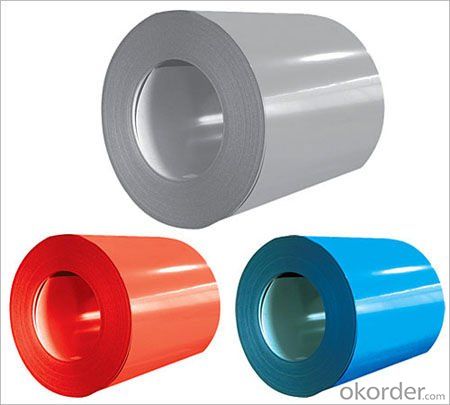
1) AVAILABLE DESIGNATION OF PPGI/PPGL
Quality | Q/BQB 440-2003 | JIS G3312-1994 | EN 10326-2004 | ASTM A653-02a |
EN 10327-2004 | (BASE PLATE) | |||
(BASE PLATE) | ||||
Commercial Steel | TDC51D | CGCC | DX51D+Z/AZ | CS Type A/B/C |
Forming Steel | (TSt01,TSt02,TSt03) | CGCD1 | FS Type A, Type B | |
Drawing | TDC52D /TDC53D | - | DX52D+Z/AZ | DDS TYPE A/C |
Steel | DX53D+Z/AZ | |||
Structural | TS280GD(TStE28) | CGC400 | S280D+Z/AZ | SS275 |
5.FAQ
2. What’s the brand of the paint?
Pre-painted layers of color
2.Main Features of the Pre-Painted Galvanized/Aluzinc Steel Coil
•
• Superior strength
Good capable of decorati
- Q: 420 440 1045 or 1065 ive bought knifes with these steel grades and i want to know which one is better.
- SAE 440 is the best. Classified as high grade cutlery steel. There are various grades of 440: A, B, C, and F. 440 A is the most stain resistant while 440 C has the most carbon and can achieve the highest hardness (Best edge Retention). SAE 440 Chemistry: 16 - 18% Chromium, 0.60 - 1.2% Carbon, 0.75% Molybdenum. SAE 420 is pretty good. Classified as cutlery steel, it is a stain resistant grade but has less chromium and significantly less carbon than SAE 440. SAE 420 Chemistry: 12 - 14% Chromium, 0.15% Carbon (min), 0 Molybdenum Chromium is what makes the steel corrosion resistant. It also adds toughness. Molybdenum adds extra corrosion resistance and adds hardenability. So you can see by chemical components that 440 is highest quality although that also means more cost. 1045 and 1065 are low quality steels and you should probably never use them for a knife. The 1 indicates plain carbon steel with little other alloying elements. The last two digits indicate how much carbon is in the steel. 1045 has 0.45% carbon, mid-range hardenability. 1065 has 0.65% carbon, high hardenability. So if I had to choose I would choose 1065 over 1045 but the difference isn't that noticeable. Everything I said here assumes they have all had the optimum Quench and Temper heat-treatment for their chemistry grade.
- Q: What are the cost implications of using steel coils in manufacturing?
- The cost implications of using steel coils in manufacturing can vary depending on several factors. Firstly, the cost of purchasing steel coils themselves can have a significant impact on overall manufacturing expenses. Steel prices are influenced by factors such as supply and demand, global market conditions, and any tariffs or trade regulations in place. Fluctuations in steel prices can directly affect the cost of purchasing steel coils, which in turn affects the overall manufacturing cost. Additionally, the size and weight of steel coils can impact transportation costs. Steel coils are typically heavy and bulky, which can incur higher shipping expenses due to increased transportation requirements. The distance between the steel supplier and the manufacturing facility can also influence shipping costs. Furthermore, the processing and transformation of steel coils into finished products can contribute to manufacturing costs. Additional steps such as cutting, shaping, welding, or coating may be required depending on the desired end product. These additional processes can require specialized machinery, skilled labor, and additional materials, all of which can add to the overall manufacturing expenses. It is also essential to consider the quality and durability of steel coils. While using high-quality steel coils may initially result in higher costs, it can lead to long-term cost savings by reducing the need for repairs or replacements. Moreover, it is crucial to factor in any regulatory or compliance requirements associated with using steel coils in manufacturing. Certain industries may have specific standards or certifications that need to be met, which can involve additional costs for testing, inspections, or compliance procedures. Lastly, it is important to consider the potential cost savings that steel coils can offer in terms of efficiency and productivity. Steel coils are often preferred in manufacturing due to their strength, durability, and ease of fabrication. These qualities can lead to improved production processes, reduced waste, and higher overall output, which can offset the initial cost of using steel coils. Overall, the cost implications of using steel coils in manufacturing can be influenced by several factors such as steel prices, transportation costs, additional processing requirements, quality considerations, regulatory compliance, and potential productivity gains. Careful analysis and consideration of these factors are crucial in understanding the overall cost impact on manufacturing operations.
- Q: What are the different types of steel coatings used on coils?
- There are several types of steel coatings used on coils, including galvanized, galvannealed, and organic coatings. Galvanized coatings involve applying a layer of zinc to the steel surface, providing excellent corrosion resistance. Galvannealed coatings involve a two-step process where the steel is first galvanized and then heated to form an alloyed surface layer, offering enhanced paint adhesion and weldability. Organic coatings, on the other hand, use paints or other protective coatings to provide corrosion resistance and aesthetic appeal.
- Q: What are the different types of steel coil packaging?
- There are several different types of steel coil packaging methods used in various industries. Some of the commonly used types include: 1. Wooden Crates: Steel coils are often packed in wooden crates for transportation and storage. These crates provide excellent protection against damage and ensure that the coils remain secure during transit. 2. Steel Frame Bundles: In this packaging method, steel coils are tightly strapped together using steel bands or wires. This creates a sturdy bundle that can be easily lifted and moved using cranes or forklifts. Steel frame bundles are commonly used in industries where the coils are required to be stacked vertically. 3. Steel Strapping: Steel coils can also be packaged using steel strapping. Straps are tightly wrapped around the coils to secure them in place. This method provides good protection against movement and damage during transportation. 4. VCI (Volatile Corrosion Inhibitor) Packaging: VCI packaging is ideal for protecting steel coils from corrosion during storage and shipment. It involves wrapping the coils in special VCI film or paper that releases corrosion-inhibiting molecules. This helps to prevent rust and corrosion, ensuring the coils remain in good condition. 5. Cardboard Packaging: Steel coils can be packaged in cardboard boxes or cartons. This method is commonly used for smaller coils or when additional protection is required. The coils are placed inside the box, which is then sealed to provide a protective barrier against damage and contamination. 6. Stretch Wrapping: Stretch wrapping involves wrapping a plastic film tightly around the steel coils, creating a secure and protective layer. This method is commonly used when the coils need to be protected from dust, moisture, or other external elements. Overall, the choice of steel coil packaging method depends on factors such as coil size, weight, transportation requirements, and the level of protection needed. Each method offers its own advantages and is selected based on the specific needs of the industry and the coils being packaged.
- Q: How are steel coils classified based on their thickness?
- Steel coils are classified based on their thickness into different categories such as light gauge, medium gauge, and heavy gauge.
- Q: How are steel coils different from steel sheets?
- Steel coils and steel sheets are both made from the same material, steel, but they differ in terms of shape and size. Steel coils are long, continuous rolls of steel that are typically wound up into a coil shape. They are generally used for industrial purposes and can be processed further to create various products like pipes, tubes, or automotive parts. On the other hand, steel sheets are flat pieces of steel that are available in various thicknesses. They are commonly used in construction, manufacturing, and fabrication processes where a flat surface is required, such as roofing, cladding, or panels.
- Q: Can steel coils be used in the food processing industry?
- Yes, steel coils can be used in the food processing industry. Steel coils are often used to manufacture a wide range of food processing equipment such as conveyor belts, food storage tanks, mixing tanks, and processing machinery. Steel is a durable and hygienic material that is resistant to corrosion, making it suitable for use in food processing environments. Additionally, steel coils can be easily cleaned and sanitized, ensuring the safety and cleanliness of the food processing equipment. Overall, steel coils are a commonly used material in the food processing industry due to their strength, durability, and compatibility with food safety standards.
- Q: Okay, I have looked all ovcer the net and it says diamonds are stronger, but why? I mean, why is diamonds used for the top equiptment rather than steel?
- Diamonds okorder
- Q: I want an EDC (Every Day Carry) Knife that:~folds~is non-serrated~has a pocket clip~has a blade length of about 4 in. long~is concealable~urban environment friendly~priced around $50What do you suggest? I am currently thinking on purchasing the Cold Steel 4 inch Zytel Ti-Lite.
- Based okorder /
- Q: How are steel coils used in the production of industrial tanks?
- Steel coils are used in the production of industrial tanks as they are rolled and formed into the desired shape to create the tank's structure. The coils provide the necessary strength and durability required to withstand the pressure and weight of the tank's contents.
Send your message to us
Pre-painted Galvanized/Al uzinc Steel Sheet Coil with Prime Quality and Lowest Price orange
- Loading Port:
- Shanghai
- Payment Terms:
- TT OR LC
- Min Order Qty:
- 100 m.t.
- Supply Capability:
- 10000 m.t./month
OKorder Service Pledge
OKorder Financial Service
Similar products
Hot products
Hot Searches
Related keywords
